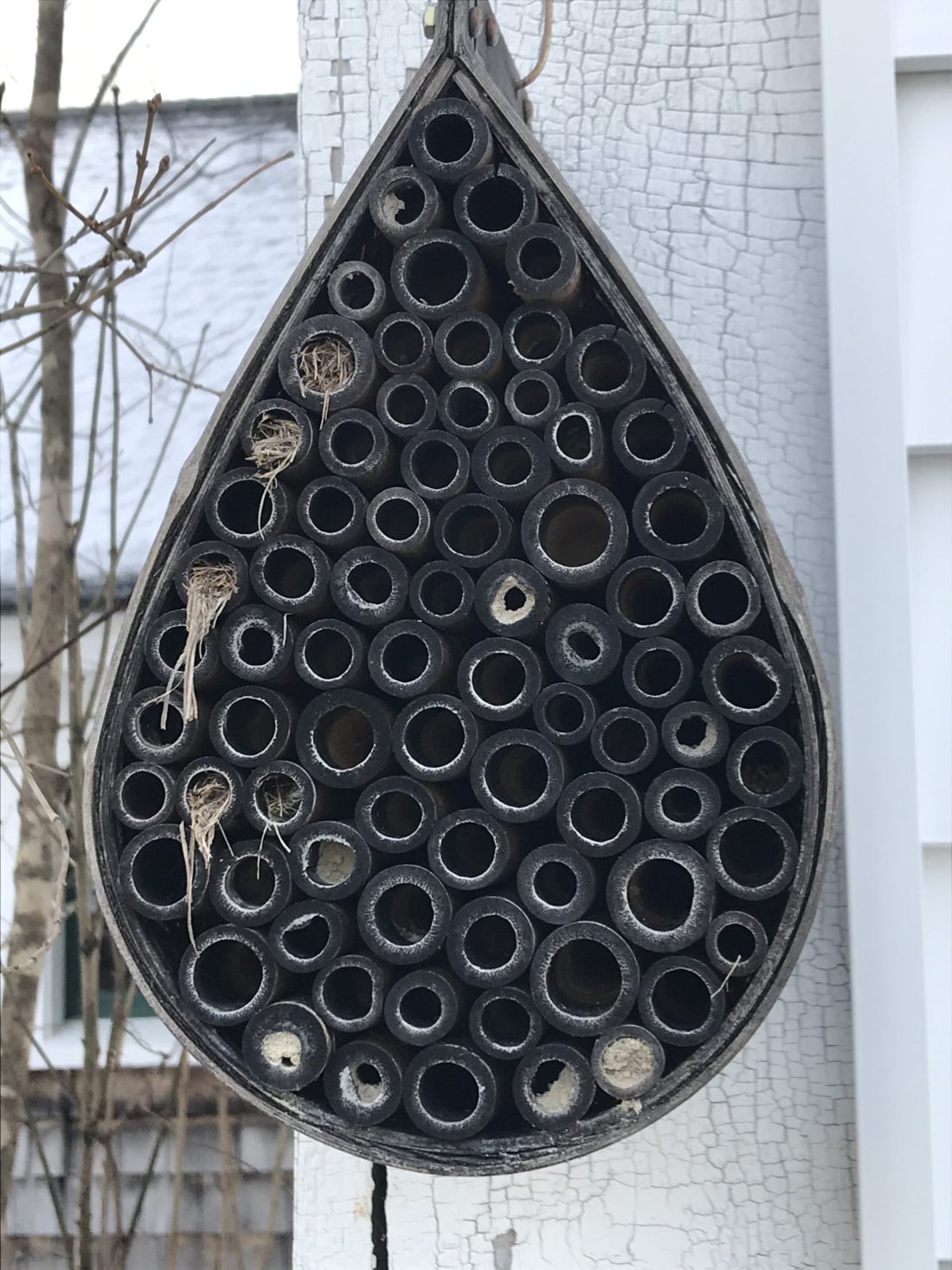Hiddenness
It is January, the month when all of the secret worlds, hidden during the season of grasping and gleaning are revealed if we grow quiet enough to be watchful. The cold light of late morning picks out the nests of birds high in the trees, or of wasps on the undersides of eaves. Fallen cones become the ornaments of the wilds, dashed by storm. The sickle moon charges the sky a blue not seen at any other time.
Indoors by a fire, we pull out boxes of old letters, or poems we tell ourselves the ordinary days don’t allow. We brew tea and hold the mug for warmth against the unceasing chill that wraps the house.
We can inhale more deeply in these post-holiday days, linger in the arms of our chair, slow the pace of our walks so that the tumblers on the locks at our heart fall into line and the more obscure chambers open. In this lull, if we let ourselves, anxiety and preoccupations lighten, even slip briefly away.
On an unseasonal balmy day, I step outside to drive to the general store to buy the paper. On my way back, I notice the drop-shaped willow construction that hangs at eye level on the side of the barn. A gift three years ago from a friend in New York who’d seen it in a catalog, it was advertised as a wintering place for bees. We have not seen bees in these parts for some time; not really. But I hung it from a nail all the same, thinking that no generous and hopeful gesture should ever go unheeded. I then promptly forgot it through the busy, peopled days of high summer.
For two years it hung, vacant, darkening with the seasons. Its once-fresh golden-green bamboo mellowed with sun, snow, wind and rain. About 10 inches high and 8 deep, it is composed of hollow bamboo tubes running front to back in a pyramid, all of them held in place by a carapace of bamboo. A fragile vegetative smell now emanates from its minute tunnels. It has grown into the weathered life of this place with a grace that conforms to all that I love here – greyed shingles and flaking window trim, the crooked garden gate. But for all of its settling, until now the bee condo has stared back at me hollow as the day it was first hung close to the lilac.
Today, however, I see the smallest signs of occupancy. Stalks of dried grass dangle like silk tassels from several of the ends. Several are plugged with what looks like wattle: a dune-colored clay-like substance obviously intended to keep some tiny create safe within. Who are my neighbors? Will I ever learn, or will they fledge and vanish into the vast wood that surrounds me here?
This is what the fostering of life actually looks like, I think, as I look at this little sanctuary. Even dung beetles, even lady bugs, or whatever is sleeping inches from my face, need their small, hidden places of retreat and regeneration, to become more concentrated, to release the strain of the productive season, to molt and dream themselves a new life simply by surrendering to what must occur in the condition of retreat, of hiddenness.
Up the hill, the vacant bird house stands sentry awaiting the barn swallows of May. The border gardens sleep, a bare furze of crimson and green that will rise to lanky riot with the return of the summer sun.
All action has gone underground, and the only evidence of ongoing life are these hollows, and small cabins from which fingers of smoke indicate the presence of life. It is one of the powerful draws of the country. Here, so much more is evident that the cities have suffocated with continuous activity, exposure, noise.
The silence is overpowering. The only sound is that of a few bits of snow melt falling into a crystalline pool along the edge of the barn. No birds. No cars. No human voices.
All life begins in hiddenness, all art, all creative action. How much more true is this of the inner life that indispensably forms our capacities to see beyond our functional worries and goals, our all-too-human tangles, to the deeper reality of which we are as small as the bees or the moths sequestered before me. These creatures teach that the hidden life is one of the gifts of deep winter, if we quiet ourselves enough to learn to enter.
“Silence is difficult,” writes Robert Cardinal Sarah, “but it enables man to let himself be led by God. From silence is born silence. Through God the silent, we can attain silence. And man is unceasingly surprised by the light that pours forth then.
“Silence is more important than any other human work…The true revolution comes from silence; it leads us toward God and others so as to place us humbly and generously at their service.”
Perhaps the tea and the poems and the old letters, the knitting and small straightening efforts I engage in at this time, are simply the best props for entering the state of near dormant repose in which I can sink into the depth of my own being, to touch down into the hummus of dreams, memories, and that truth that is deeper than intellect, which I know in my bones and belly and soul. Perhaps by entering into silence, I will feel the stirrings of what Sarah calls “the divine liberation that unifies man and places him at the center of himself…”
The snow continues its gentle percussive reassurance. The moth’s cathedral, this compendium of secrets, gives nothing away. Like a good poem. Like the soul in its essence and integrity. Its small, fleeting life!
My own home is large enough for more than a single organism, full of clutter and accumulations. But my body? This one, this minute, passing, physical self can, as the tea cools and the fire dies down, be a sanctuary for silence, a cathedral of hiddenness, in which I can rest a while, shed old stories and heal the wounds that life inflicts, ask forgiveness from those I have hurt without knowledge or intent, where I can listen for the murmur of angels until a gradual shift in the sunlight, a softening of the air and ground stirs in me that renewed sense of the sacredness of life so that I too re-emerge and take wing as a more whole and liberated creature.
(with thanks to Carmen P.)





Susan Porter
January 3, 2020at6:01 pmDear Kathleen,
This is such a beautiful piece. I feel as though I’m sitting beside you in a chair looking out the window at the farm. Your prose is so poetic…each sentence lavish with quiet imagery. This piece is right up there with one of my favorite winter poems: Snowbound by Whittier. Full of the details of what is just beyond our view. I look forward to seeing what else emerges from the silence that you crave!
kathleen.hirsch
January 4, 2020at7:36 amI always gain more than I give from my wonderful readers. Thank you for this reference, Susan. I don’t know the poem, but will find it today!
Susan Porter
January 3, 2020at5:51 pmDear Kathleen,
This is such a beautiful piece. I feel as though I’m sitting beside you in a chair looking out the window at the farm. Your prose is so poetic…each sentence lavish with quiet imagery. This piece is right up there with one of my favorite winter poems: Snowbound by Whittier. Full of the details of what is just beyond our view. I look forward to seeing what else emerges from the silence that you crave!
Kathleen Hirsch
December 14, 2023at8:53 amSusan, so lovely to have this reminder of Whittier. Blessings!
Kathleen
Sue O’Reilly
January 3, 2020at3:38 pmI love your observation: “The silence is overpowering.” It is perhaps the only overpowering—good or bad that doesn’t take your breath away. What tells me no matter how difficult we have made it, silence is where we are meant to be.
kathleen.hirsch
January 4, 2020at7:36 amYes yes and yes, Sue. Thanks so much for this. Blessings.
Nancy Rappaport
January 3, 2020at11:13 amThank you for such a contemplative piece !!! I love how you bring us into the sacred silence with words and take the time to ease us into wonder. I am reminded of Pablo Neruda’s poem which I was introduced while hiking with a close friend.
Here’s to regeneration!
Keeping Quiet
Pablo Neruda
Now we will count to twelve
and we will all keep still
for once on the face of the earth,
let’s not speak in any language;
let’s stop for a second,
and not move our arms so much.
It would be an exotic moment
without rush, without engines;
we would all be together
in a sudden strangeness.
Fishermen in the cold sea
would not harm whales
and the man gathering salt
would not look at his hurt hands.
Those who prepare green wars,
wars with gas, wars with fire,
victories with no survivors,
would put on clean clothes
and walk about with their brothers
in the shade, doing nothing.
What I want should not be confused
with total inactivity.
Life is what it is about;
I want no truck with death.
If we were not so single-minded
about keeping our lives moving,
and for once could do nothing,
perhaps a huge silence
might interrupt this sadness
of never understanding ourselves
and of threatening ourselves with death.
Perhaps the earth can teach us
as when everything seems dead
and later proves to be alive.
Now I’ll count up to twelve
and you keep quiet and I will go.
kathleen.hirsch
January 3, 2020at11:22 amWow, Nancy. Beautiful. What a gift! Thank you for posting for others to read and contemplative on this day of more hard news. Blessings on you, always.